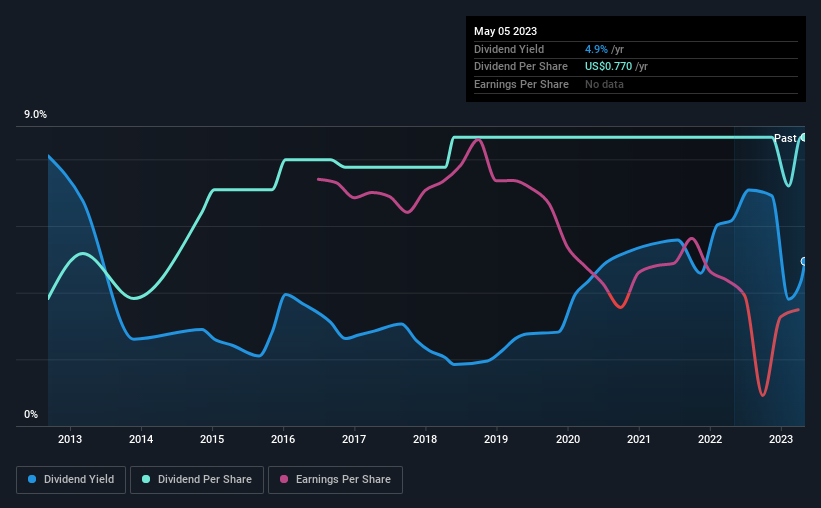Do These 3 Checks Before Buying Universal Insurance Holdings, Inc. (NYSE:UVE) For Its Upcoming Dividend
Readers hoping to buy Universal Insurance Holdings, Inc. (NYSE:UVE) for its dividend will need to make their move shortly, as the stock is about to trade ex-dividend. The ex-dividend date is one business day before a company's record date, which is the date on which the company determines which shareholders are entitled to receive a dividend. The ex-dividend date is important because any transaction on a stock needs to have been settled before the record date in order to be eligible for a dividend. This means that investors who purchase Universal Insurance Holdings' shares on or after the 11th of May will not receive the dividend, which will be paid on the 19th of May.
The company's next dividend payment will be US$0.16 per share. Last year, in total, the company distributed US$0.77 to shareholders. Based on the last year's worth of payments, Universal Insurance Holdings stock has a trailing yield of around 4.9% on the current share price of $15.58. Dividends are an important source of income to many shareholders, but the health of the business is crucial to maintaining those dividends. So we need to check whether the dividend payments are covered, and if earnings are growing.
See our latest analysis for Universal Insurance Holdings
Dividends are typically paid out of company income, so if a company pays out more than it earned, its dividend is usually at a higher risk of being cut. Universal Insurance Holdings reported a loss after tax last year, which means it's paying a dividend despite being unprofitable. While this might be a one-off event, this is unlikely to be sustainable in the long term.
Click here to see how much of its profit Universal Insurance Holdings paid out over the last 12 months.
Have Earnings And Dividends Been Growing?
When earnings decline, dividend companies become much harder to analyse and own safely. If earnings fall far enough, the company could be forced to cut its dividend. Universal Insurance Holdings was unprofitable last year and, unfortunately, the general trend suggests its earnings have been in decline over the last five years, making us wonder if the dividend is sustainable at all.
Many investors will assess a company's dividend performance by evaluating how much the dividend payments have changed over time. Universal Insurance Holdings has delivered an average of 8.5% per year annual increase in its dividend, based on the past 10 years of dividend payments.
Remember, you can always get a snapshot of Universal Insurance Holdings's financial health, by checking our visualisation of its financial health, here.
The Bottom Line
From a dividend perspective, should investors buy or avoid Universal Insurance Holdings? It's hard to get past the idea of Universal Insurance Holdings paying a dividend despite reporting a loss over the past year - especially when the general trend in its earnings also looks to be negative. All things considered, we're not optimistic about its dividend prospects, and would be inclined to leave it on the shelf for now.
With that in mind though, if the poor dividend characteristics of Universal Insurance Holdings don't faze you, it's worth being mindful of the risks involved with this business. Case in point: We've spotted 3 warning signs for Universal Insurance Holdings you should be aware of.
Generally, we wouldn't recommend just buying the first dividend stock you see. Here's a curated list of interesting stocks that are strong dividend payers.
Have feedback on this article? Concerned about the content? Get in touch with us directly. Alternatively, email editorial-team (at) simplywallst.com.
This article by Simply Wall St is general in nature. We provide commentary based on historical data and analyst forecasts only using an unbiased methodology and our articles are not intended to be financial advice. It does not constitute a recommendation to buy or sell any stock, and does not take account of your objectives, or your financial situation. We aim to bring you long-term focused analysis driven by fundamental data. Note that our analysis may not factor in the latest price-sensitive company announcements or qualitative material. Simply Wall St has no position in any stocks mentioned.
Join A Paid User Research Session
You’ll receive a US$30 Amazon Gift card for 1 hour of your time while helping us build better investing tools for the individual investors like yourself. Sign up here

